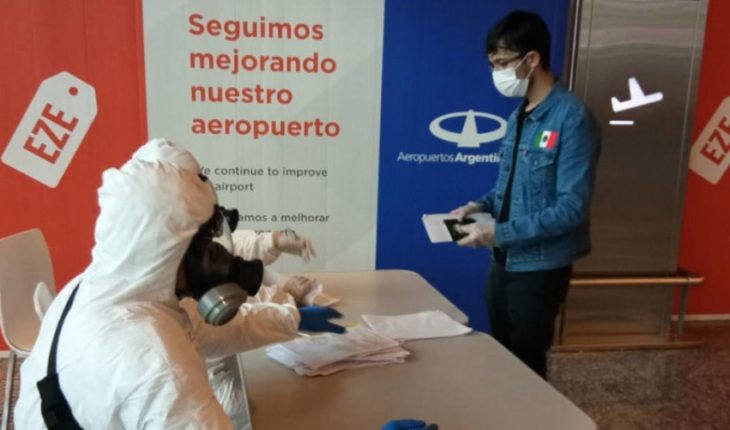It was the first time in his life that Néstor Morales, a young day laborer and 21-year-old student from Hermosillo, Sonora, left Mexico. And, paradoxically, it wasn’t to go north to the United States, whose border has a few miles from his home.
Nestor went much further and in the opposite direction: to the southern end of the planet.
-I went to Argentina, to the province of San Luis. My college offered me an exchange scholarship for a few months and I thought it was a great opportunity. So I accepted it.
The sonorense explains through a somewhat intermittent whatsApp call that to get to that scholarship he had before sweating a lot. And the sweating thing is not metaphorical, he stresses, because to pay for his studies in Mechatronic Engineering he has to alternate the books with the field, where he works collecting the seasonal fruit or packing food.
That’s why, when his university offered him the chance to exchange, Nestor still has excitedly felt he was facing a great opportunity in his career and also in his life.
He didn’t think much of it. He took an Aeromexico flight that traveled more than 9,000 kilometres south and was planted in a country unknown to him; nervous, but with the illusion and expectation of seeing and getting to know new world.
But the euphoria was short-lived.
-I arrived in early March. And like a week and a half or so… Boom! They declare quarantine by the coronavirus.
On the other side of the call, Nestor laughs tired, resigned.
-So I haven’t been able to do my course in college or anything. In fact, I haven’t even had a chance to know the street where I’m living. I was terrible at luck.
However, after a few seconds of reflection, the Sonorense says that once the anger has passed at not being able to live a great experience in another country and continue his studies, now what he feels is uncertainty; especially since the Argentine government on April 25 tightened measures to keep the coronavirus pandemic at bay, banning commercial flights by decree until September 1.
That is, no one enters the country or leaves by air in at least half a year.
And to get out by land, the situation is just as complicated. Since 20 March last, President Alberto Fernández imposed a “mandatory total quarantine” that prohibits going out on the street – with the exception of going to buy food or the pharmacy – and moving from one province to another without a safe conduct. A restriction that Argentine police took very seriously: just 48 hours after a state of emergency was declared, 743 people were arrested for failing to comply with quarantine.
Faced with these restrictions, Nestor went from being an exchange student to thickening the list of 290 connationals who, according to the Mexican Ministry of Foreign Affairs, remain stranded in Argentina.
“I want to get out of here,” says the Sonorense. I need to get out of here! -exclaims to raise that Aeromexico has already cancelled its return flight scheduled for the beginning of July. You can only exchange it for another flight departing from 1 September, when the ban ends. But the problem, the student points out, is that their money reservation will not last beyond June, when he finished his stay.
-If flights open until September, what money will I live here for half a year without being able to work? -questioned. Every day I spend here is one more day I run out of money. And one more day when pressure and anguish is on the rise.
Three times trapped
Fernando Hernández is 24 years old, from Chetumal, and arrived in Buenos Aires in October last year to study a master’s degree in human rights that was to last ten months, until August of this year.
However, it also explains through a WhatsApp call, the pandemic went through and became stranded between the walls of an apartment in Buenos Aires that rents with two other roomies, which are also trapped.
Fernando says he had his return flight ready by early August. The problem is that the University of San Martín, in Buenos Aires, interrupted classes because of the pandemic and until just a few weeks ago gave them the authorization to resume them online, from Mexico.
“But with the restriction of flights I was trapped,” the student says. Because even if I could afford another one, which is not the case, I can’t leave the country.
And travel by road to Uruguay “it is impossible” without a safe conduct or a special permit from the Mexican embassy. And, even if it made it to the border, it could not enter either because the Uruguayan government only allows until further notice the entry to its connationals and resident foreigners.
-We are trapped three times: in our department, from which we can hardly leave at all; trapped in Buenos Aires, because we cannot move to other cities or provinces without a safe conduct; and trapped by Argentina’s borders, since we cannot go to any other country.
In the city of Mendoza, on the west side of Argentina, almost on the border with Chile, Tijuan student Melissa Zulette Arenas says that she bought her flight back from Santiago de Chile because it was much more practical than traveling a thousand kilometers to Buenos Aires.
But Sebastian Piñera’s government also restricted flights until June 1, and worse, it also decreed measures that restricted access to the country to non-resident foreigners during the health emergency.
That is, neither Chile nor Uruguay is an option. And Brazil, one of the countries most affected by coronavirus in South America, with more than 135,000 infected at the cut on Thursday, May 7, and more than 9,100 deaths, is also no option.
-I can’t fly and I can’t drive to Buenos Aires. I don’t know what to do. I feel very trapped,” says the Tijuanense.
“We expect a response from the embassy”
The student Fernando Hernández proposes that, in the face of the impossibility of travel and the progressive economic wear and tear, his only departure, and that of the majority of the 290 Mexicans that are stranded at the moment in Argentina among students and tourists, is a repatriation flight.
In fact, the Mexican Chancellery has already carried out multiple repatriation flights. Until the may 4, cut-off, it has brought back 11,342 connationals since the pandemic broke out, and has also made several repatriation flights from Argentina.
For example, on April 11 and 13, following the closure of borders and cancellations of commercial flights, Chancellor Marcelo Ebrard announced on his Twitter account that 160 connationals who were repatriated from Argentina, as well as Chile and Uruguay, returned.
The problem, of course, is that there are still many Mexicans stranded by the pandemic: according to Chancellery, 2 thousand 868 are still trapped at the May 4 cut somewhere in the world, of which a thousand 242 remain in countries with commercial flight restrictions, as is the case of Argentina.
In other words: bringing everyone right away is complicated. And even more so because of the air restrictions. That is why the Chancellery told this medium that they are working on finding options to support connationals. Although, because of the volume of connationals to attend to, the call is to be patient.
However, patience and money to stay afloat agree to the Mexican students interviewed, is what is beginning to be lacking.
-The Mexican embassy in Argentina has been very friendly. But you’ve been as kind as you have been inefficient. The answer is always the same: they are working to give us the best conditions, but without telling us more. And so we’ve been waiting for a response for three weeks or a month, fernando says.
“The embassy only tells us that it has no information on when the next humanitarian flight will depart – tertiary on its part the student Sonorense Nestor Morales. And this causes us even more anguish. Because we don’t know when we can get out of here and go home.
“They tell us there will be another flight but not when,” he regrets the Tijuanense Zulette Arenas. We need at least a date to be gived us emotional stability. And from now on, we see how we do it with the money. But at least we need to be told something safe. We need a little certainty of what will happen to us.
What we do in Animal Político requires professional journalists, teamwork, dialogue with readers and something very important: independence. You can help us keep going. Be part of the team.
Subscribe to Animal Político, receive benefits and support free journalism #YoSoyAnimal.
translated from Spanish: Students stranded in Argentina call for help to return to Mexico
May 8, 2020 |





